

Anglo-Saxon. Anglo-Saxons: a brief history. Publication date: 13th January 2011 King Arthur as one of the Nine Worthies, detail from the 'Christian Heroes Tapestry' This period is traditionally known as the Dark Ages, mainly because written sources for the early years of Saxon invasion are scarce.
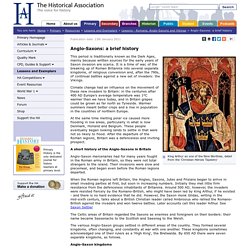
It is a time of war, of the breaking up of Roman Britannia into several separate kingdoms, of religious conversion and, after the 790s, of continual battles against a new set of invaders: the Vikings. Climate change had an influence on the movement of these new invaders to Britain: in the centuries after 400 AD Europe's average temperature was 1°C warmer than we have today, and in Britain grapes could be grown as far north as Tyneside. Warmer summers meant better crops and a rise in population in the countries of northern Europe.
At the same time melting polar ice caused more flooding in low areas, particularly in what is now Denmark, Holland and Belgium. History - Ancient History in depth: The Anglo-Saxons. Anglo-Saxon Poetry: Characteristics & Examples. In this lesson, we will review the general history of Anglo-Saxon society and its era.

Then, we will look closer at the characteristics of the literature, specifically the poetry, of that era. Explore our library of over 10,000 lessons Click "next lesson" whenever you finish a lesson and quiz. Got It You now have full access to our lessons and courses. You're 25% of the way through this course! The Anglo-Saxon Hero. By Christopher Garcia In Anglo-Saxon culture and literature, to be a hero was to be a warrior.
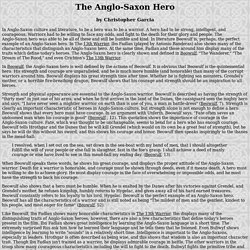
A hero had to be strong, intelligent, and courageous. Warriors had to be willing to face any odds, and fight to the death for their glory and people. Saxon Kings: House of Wessex. Æthelwulf (839-58 AD)
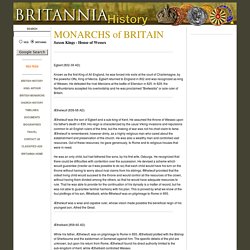
Alfred the Great: The Most Perfect Man in History? King Alfred of Wessex (r.871-99) is probably the best known of all Anglo-Saxon rulers, even if the first thing to come into many people’s minds in connection with him is something to do with burnt confectionery.
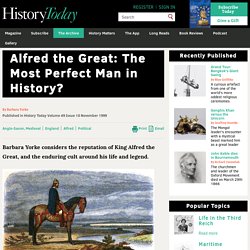
The year 1999 saw the 1100th anniversary of his death on October 26th, 899, at the age of about 50. The occasion is being marked with conferences and exhibitions in Winchester, Southampton and London, but the scale of celebrations will be modest compared with those which commemorated his millenary, and culminated in the unveiling by Lord Rosebery of his statue in Winchester. Alfred’s reputation still stands high with historians, though few would now want to follow Edward Freeman in claiming him as ‘the most perfect character in history’ (The History of the Norman Conquest of England, 5 volumes, 1867-79). Alfred is someone who has had greatness thrust upon him.
How and why did he acquire his glowing reputation, and how does it stand up today? Anglosaxon Literature and Prose - Beaming Notes. The Germanic forefathers of the English brought with them their own poetry but there is no evidence of them bringing any prose writings.
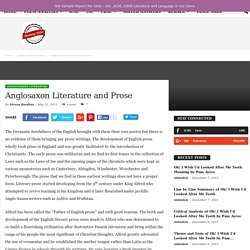
Anglo-Saxon literature: Prose. Old English literary prose dates from the latter part of the Anglo-Saxon period.

Prose was written in Latin before the reign of King Alfred (reigned 871–99), who worked to revitalize English culture after the devastating Danish invasions ended. As hardly anyone could read Latin, Alfred translated or had translated the most important Latin texts. He also encouraged writing in the vernacular. Didactic, devotional, and informative prose was written, and the Anglo-Saxon Chronicle, probably begun in Alfred's time as an historical record, continued for over three centuries. Two preeminent Old English prose writers were Ælfric, Abbot of Eynsham, and his contemporary Wulfstan, archbishop of York.
Discribe the features of Anglo-Saxon Poetry in detail. - Homework Help. The poetry of the Anglo-Saxons is defined by the following characteristics: 1.
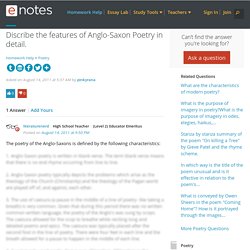
Anglo-Saxon poetry is written in blank verse. The term blank verse means that there is no end rhyme occurring from line to line. 2. Anglo-Saxon literature: Poetry. There are two types of Old English poetry: the heroic, the sources of which are pre-Christian Germanic myth, history, and custom; and the Christian.
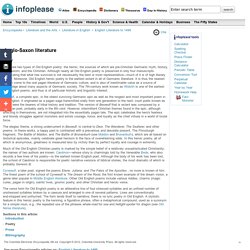
Although nearly all Old English poetry is preserved in only four manuscripts—indicating that what has survived is not necessarily the best or most representative—much of it is of high literary quality. Anglo-Saxon. History - Ancient History in depth: The Anglo-Saxons. Anglo-Saxon England. The Romans officially withdrew from Britain in AD 410.
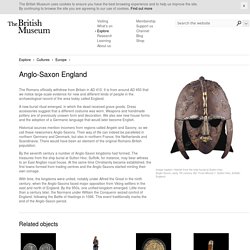
It is from around AD 450 that we notice large-scale evidence for new and different kinds of people in the archaeological record of the area today called England. A new burial ritual emerged, in which the dead received grave goods. Dress accessories suggest that a different costume was worn. Weapons and handmade pottery are of previously unseen form and decoration. We also see new house forms and the adoption of a Germanic language that would later become English. Historical sources mention incomers from regions called Angeln and Saxony, so we call these newcomers Anglo-Saxons. Anglo%20Saxon%20Beowulf%20PPT%20for%20Careers.pdf. Anglo-Saxon literature Facts, information, pictures.